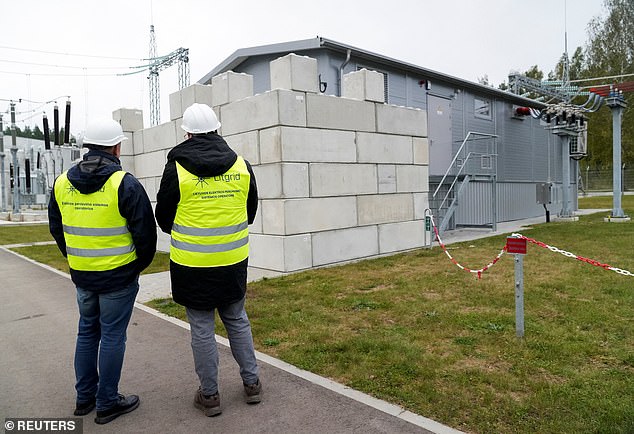Lithuania has told its citizens to start preparing bomb shelters as fears grow that the Baltic nation could be dragged into war with Russia.
The country, which borders Belarus and Russia’s Kaliningrad enclave, has been urging its residents to prepare for more than a year.
Its location is seen as a potential danger, given that Belarus is a close ally of Putin, and both countries conduct joint Zapad military drills.
This year, the government said: ‘There are currently 6,453 bomb shelters in Lithuania that can accommodate approximately 1.5 million people, or about 54% of the country’s population.’
In the country’s capital, Vilnius, the basements of many buildings have been turned into shelters.
‘People wanted to feel safe, to know that they could protect themselves in the event of bombing and war, for at least a few days,’ said Vidas Magnavicius, a building manager. ‘We agreed that we had to prepare for the worst.’
The warnings come as Vladimir Putin threatens swift retaliation against Europe, insisting Moscow will respond if provoked.
Speaking at the Valdai Discussion Club in Sochi on Thursday, he said: ‘Russia’s countermeasures will not be long in coming.’
‘If anyone still has a desire to compete with us in the military sphere, as we say, feel free, let them try,’ he warned.
‘The elites of united Europe continue to whip up hysteria,’ he added. ‘It turns out that war with the Russians is almost on the threshold. They repeat this nonsense, this mantra over and over again.’
Despite Putin’s threats and the Lithuanian government’s calls, critics have warned that many of the shelters in the country are outdated or too small.

Lithuania has been urging its citizen to prepare bomb shelters amid the growing fears of a direct conflict with Russia

Vladimir Putin with Belarus’ leader Alexander Lukashenko at a meeting last year. Lithuania’s location between Russia and Belarus makes it particularly dangerous as the two leaders are close allies
More than half of municipalities face shortages, and some shelters exist only on paper.
The Vilnius city council has promised to upgrade 32 sites so they can be ready within 12 hours of an emergency.
The Interior Ministry has also launched a civil defence programme, putting tens of millions of euros into improvements.
Officials admit the hardest part may be persuading people to prepare without causing panic.
‘It would also be irresponsible to annoy people with talk about war, but we all need to find a way to address this very complex topic,’ said Donatas Gurevicius of the Lithuanian Fire and Rescue Service.
He added: ‘New residential buildings and large public buildings in Lithuania must now be equipped with bomb shelters, a practice that countries well-prepared for civil defense, such as Finland and Switzerland, have been implementing for decades.’
Lithuania, a former Soviet republic of 2.9 million people and now a member of NATO and the EU, has already approved a war evacuation plan.
Vulnerable residents would be moved to safety, while those able to fight would support the army.
The government has also produced an interactive shelter map and a survival guide showing people how to last 72 hours in a crisis.

NATO countries are on high alert after several Russian provocations on the organisation’s eastern flank
The war in Ukraine, Europe’s deadliest conflict since World War II, has already triggered the worst confrontation between Russia and the West since the Cuban Missile Crisis.
The Kremlin denies it plans to attack NATO, but officials in Vilnius fear their country could be next.
Many European countries are now gearing up for a possible war with Russia not just Lithuania.
Finland, which shares a long border with Russia, is strengthening defences.
This week, there were calls for Sweden, known for its neutrality to start building its own nuclear weapons to deter Putin.
Several NATO countries are also on high alert after several Russian provocation on the organisation’s eastern flank, including Putin flying powerful fighter jets over Estonia’s airspace last week.
Many countries, including the UK, Poland, and Germany have issued chilling warnings against further agression.
This article was originally published by a www.dailymail.co.uk . Read the Original article here. .

